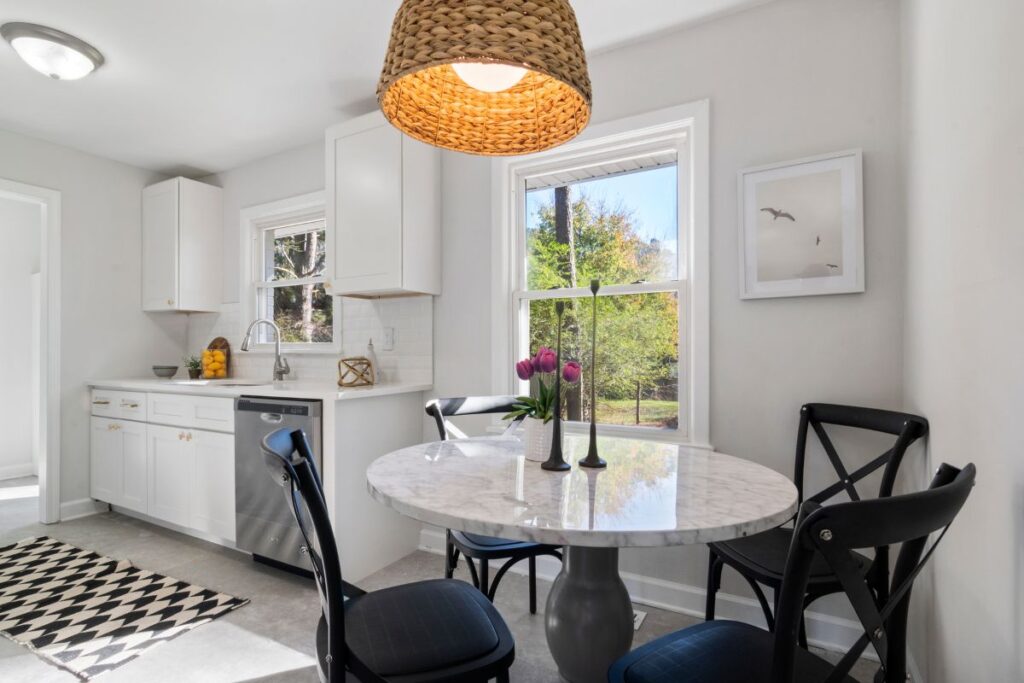Inside: There are many ways that minimalism is more than a home decor trend. Read on for ten ways it can improve your home, life, and the planet.
A guest post by Cora Gold
The word “minimalist” is used to describe everything from watch and clothing designs to art and home decor.
In more recent years, more attention has been given to the minimalism movement thanks to front runners like Joshua Becker, Marie Kondo, and The Minimalists.
They’ve raised awareness that minimalism is more than a home decor trend. It’s a way of life.
It’s a mindset and a healthy way of living in a chaotic world. Here are 10 ways that minimalism is more than a home decor trend.

10 Ways Minimalism is More Than a Home Decor Trend
Have you considered adopting a more minimalist home? Here are ten ways that minimalism goes beyond home decor and can positively impact your home, life, and the earth.
1. It Clears Away the Old
Could you use a reset, a do-over? Many of us could, but time has a pesky way of continuing without allowing us to erase the past – unless we do so symbolically.
Minimalism can help you to do so by inviting you to clear out the old. It encourages you to examine each object in your space and mindfully explore why you keep it.
For example, is there a reason you’re still clinging to your old wedding dress years after a divorce? It’s one thing if you’re saving it to hand down to your daughter when she comes of age, but quite another if it haunts your closet like a ghost.
Why not turn that negative energy around by donating it to a soon-to-be bride?
2. It Ensures the New Has Value
Minimalism isn’t only about finding new, loving homes for items you no longer need. It’s also about examining your life, your values, and what brings you joy.
This practice encourages one-in-one-out living, where you donate, recycle, or repurpose an old item each time you bring something new into your home.
It draws awareness to your likes and dislikes – will the new model be superior to the old? If not, why do you need it?

3. It Saves Time
Visualize someone you know whose house overflows with knick-knacks. Now, imagine what their weekly house cleaning to-do list must look like. All those figurines take hours to dust, but otherwise, your family sneezes.
Minimalism is fabulous for people who don’t want to spend hours cleaning the house – isn’t that everyone?
The fewer possessions you own, the less you have to spend on upkeep.
4. It Saves Money
Minimalism means living a simple life with only the necessities. If you take time to evaluate different areas of your life, you can start to see places where you’re spending money unnecessarily.
Maybe you’re overbuying groceries because you overestimate how much your family will eat. Or it could be that you impulsively buy new clothes without realizing how many gems are hidden in the back of your closet.
With minimalism, you can cut down on these expenses by shopping more intentionally and saving money for things you really need.
Committing yourself to minimalism also requires you to take better care of the items you already have. There are some things you use constantly, such as towels and linens, so it might seem inevitable that they will experience some wear and tear.
However, you can extend their lifespan by learning how to properly care for them, like washing linens without fabric softener and allowing towels to dry completely after use.
You’d be surprised how these simple changes can help you avoid buying new items sooner than necessary.

5. It Increases Each Item’s Value
What is value? Whether you think of it in terms of financial cost or what a beloved belonging means to you, minimalism increases both.
Minimalism helps you appreciate the joy brought into your life by the items you have. By mindfully examining what each belonging surrounding you means, you become thankful.
Gratitude is a key component of positive mental health, helping you stay out of depression-inducing despair.
Furthermore, when you’re grateful for what you have, you aren’t always looking to add more and more stuff. However, when you do need something, opting for quality over quantity helps you to get more use out of the select items you do choose to bring into your home.
6. It Helps You Go Green
Do you wish that you could do more to help the planet? Every decision counts, including when and how often you shop. Each trip to the store produces carbon emissions, contributing to global warming.
Minimalism helps green your footprint in several ways. It challenges you to consider new uses for old items before you dispose of them.
For example, do you need to buy more citronella candles when you can make a mosquito catcher out of an old soda bottle and some sugar water?
This practice also encourages you to apply minimalism principles to your daily routines. Why make six trips to the store, hitting various shops on different days? Why not combine your tasks into one trip, reducing emissions?

7. It Saves Landfill Space
Landfills are not only unsightly because they’re also negatively impacting the earth. How? They contain a mix of organic and inorganic waste.
Although plant-based matter eventually breaks down to soil, these facilities’ conditions aren’t right for it. As a result, they pump countless tons of methane into the air each year, a greenhouse more hazardous than carbon in terms of global warming.
Think of all the little things you mindlessly buy simply because they catch your eye. Instead, one of the ways that minimalism and sustainability go hand in hand is that it encourages you to reflect before making a purchase.
As a result, you accumulate less clutter and have less to throw away during each spring and fall cleanup.
8. It Decreases Stress
A messy, cluttered home increases stress levels. Psychologically, your brain becomes overwhelmed by all the visual stimuli, leading to panicky feelings.
Unfortunately, you could get so overwhelmed by how much there is to do that you stagnate, caught in an endless loop of, “I should” and, “But where do I start?”
Minimalism eliminates stress by clearing all those distractions from your visual field. Remember, it also means less cleaning, which opens up your weekly to-do list.
Why not replace some of those scrubbing chores with meaningful self-care?

9. It Improves Family Relationships
Stuff creates stress for individuals in the home and can also put a strain on family relationships. No one wants to keep asking others in the household to put things away. More stuff also leads to more that needs to be cleaned.
Cutting down on stuff, and thereby cleaning, can harmonize relationships by keeping one partner from feeling overwhelmed.
Furthermore, minimalism gives you more time. Fill those hours with wholesome family activities that bring your clan closer.
10. It Reminds You There’s More to Life Than Stuff
What is life for, anyway? Few people lay on their deathbed, musing, “I wish I had bought more stuff.” What they regret most is the time they spent pursuing material wealth at the cost of time with those they love.
Minimalism reminds you what’s important. He who dies with the most toys still dies – so make the most of living!
Why Minimalism Is More Than a Home Decor Trend
Minimalism has become increasingly popular in recent years. But this practice is more than a home decor fad – it’s a mindset and a lifestyle. How can embracing these practices enhance your life?

Cora Gold is the Editor-in-Chief of Revivalist magazine. She loves writing about family and living life to the fullest. Follow Cora on Twitter, Facebook and Pinterest.
Have you found that minimalism is more than a home decor trend in your life? Tell us about it in the comments!
Sign up on the form below to get weekly decluttering tips sent straight to your inbox. You’ll also get the free Your Home Decluttered Jumpstart which includes 100 easy items to declutter and 12 high-impact areas to declutter in 10 minutes.

